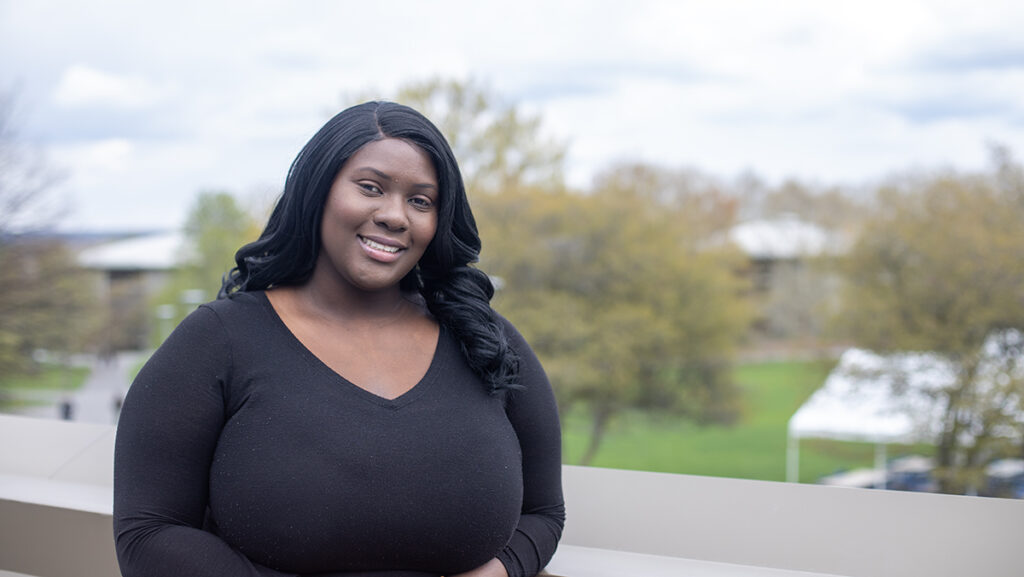Mame Ndiaye assumed the role of assistant director in the Office of New Student and Transition Programs at Ithaca College at the start of Fall 2022.
Ndiaye is currently in the process of completing her second master’s in public administration from Cornell University. Ndiaye has previously worked as residence director at SUNY Cortland and most recently in other roles at Ithaca College, where she oversaw six residence halls and served as a Title IX hearing officer.
Additionally, Ndiaye served as a graduate assistant for the Hubert Humphrey Fellowship Program at Cornell University and founded her own company, Professional and Advanced Youth Development, in 2020. Ndiaye is an advocate for diversity and is experienced in diversity recruitment.
Contributing writer Himadri Seth spoke with Ndiaye about her plans for the upcoming Fall 2023 orientation and what she hopes to see in terms of diversity recruitment for the college.
This interview has been edited for length and clarity.
Himadri Seth: What are some of your plans for Fall 2023 orientation?
Mame Ndiaye: I’m excited for it! We had great feedback last fall and got amazing engagement at our evening socials. Some of the plans are going to be similar — we are doing some academic sessions where new students can mingle with other students at their school, followed by evening socials. Additionally, we want to ensure that students not only understand the resources that are available to them, but can also connect a person — someone they can relate with — to that office.
HS: What is something that will make Ithaca College’s fall orientation unique?
MN: I’m feeling very optimistic about the upcoming orientation. I started last year in June, and I came into an amazing team. … Unfortunately, when I was an undergrad, I didn’t go to my orientation. And I regretted it because three months into orientation, I was like, ‘Where’s the health office?’ So, I’m optimistic about orientation because we are trying to make it fun so that students actually enjoy attending and aren’t just bombarded with a boatload of information. On top of that, I am optimistic about the team that I have, from our administrative assistant to our student engagement assistants.
HS: How does your past work experience translate to this position?
MN: I started PAYD, a career services business, in 2020. I am a first-generation student from New York City, and I come from a family of immigrants. One thing that I noticed as I was going through my academic career was that I didn’t have that person to go to ask questions that you may not necessarily want to ask someone, those questions that you are embarrassed to ask. So, I started a career coaching business, and we pretty much walk students through the application process. We do interview readiness seminars [and] we partner with international institutions. … Our motto is that we give people the rich resources they need to get paid. One of the tools that I’ve been able to gather through founding this business and overseeing it is that when someone is going through a storm, and by that, I mean when someone is put into a new environment and is figuring things out, it is important to be emotionally intelligent and be the calm in that person’s storm. So, I think that relates to this position and orientation because I’ll get a new student or new professional who has so many questions about this new environment … [and] they are going on a new journey and just want a safe, comfortable, welcoming, open and honest person to talk to about that.
HS: What are the most important things to be considered when it comes to diversity recruitment?
MN: I’m a woman of color and I have served on recruitment committees and search committees for multiple higher education institutions and other corporations. So, when an institution or an organization really wants to ensure that they hire diverse candidates, they want to ensure not just that they are marketing properly but that the hiring process is fair to diverse candidates. Additionally, once these candidates are here, we need to ensure that they have the resources to succeed. Personally, when it comes to diversity recruitment, there’s a disconnect where the candidate wants to be a part of this environment but also wants to feel comfortable and feel welcomed. Beyond diversity, equity and inclusion, that belonging piece is very important to me. I think it is very important for the candidate to feel a sense of belonging [and] feel comfortable in that environment and feel valued.
HS: What are some other things you look forward to doing in this role?
MN: I look forward to meeting families, supporters and just getting to know the students and their backgrounds. I had a family from Gambia who came to the admitted students event and I wasn’t there but they sent me an email because they saw my last name, and it’s a common last name in Senegal. Senegal and Gambia are two West African countries that are side by side. So, when she saw my last name, she told me how excited she was to see someone who could relate to her son’s culture and lived experiences and help him feel more comfortable in college. It’s getting to know our incoming students, not just this person as a student, but their lived experience, like, ‘Who are you? How can I help you?’








